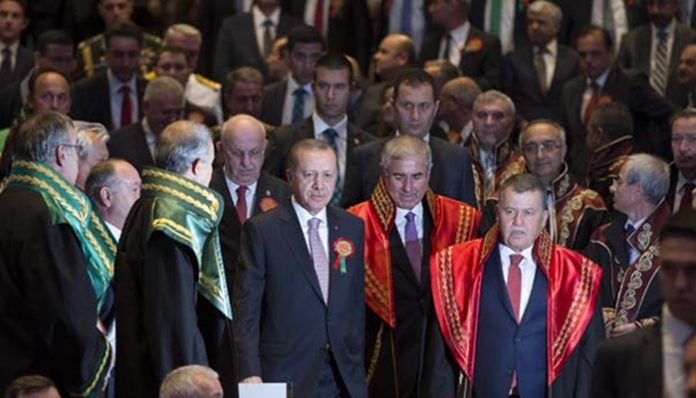Turkey’s Supreme Board of Judges and Prosecutors (HSYK) has suspended the three judges who on Friday released 21 journalists after eight months of pre-trial detention as well as dismissing 45 other judges and prosecutors, Cumhuriyet reported.
According to the report Judges İbrahim Lorasdağı, Barış Cömert and Necla Yeşilyurt Gülbiçim were suspended by the HSYK.
According to TurkeyPurge, the HSYK has dismissed 4,272 judges and prosecutors over alleged links to the Gülen movement since the July 15 coup attempt, while Turkey’s Interior Minister Süleyman Soylu announced on Sunday that 2,575 judges and prosecutors have been jailed.
The İstanbul 25th High Criminal Court had ruled for the release of 21 out of 26 journalists who were accused of membership in the faith-based Gülen movement, which has been designated as a terror organization by the Turkish government and accused of orchestrating a failed coup last summer.
The 21 journalists were not released because either a prosecutor objected to the release of some of them or a new investigation was launched into others.
The independence and impartiality of the Turkish judiciary has begun to be questioned once again after an İstanbul court decided to release 21 journalists from jail on Friday but reversed its decision hours later without the journalists being ever freed.
The development has led to huge disappointment among families of the journalists who waited for long hours in front of prisons in İstanbul to be reunited with their loved ones.
The moment after the court’s decision was announced for the release of the 21 journalists, pro-government journalists and figures launched a campaign on social media, angrily demanding their re-arrest.
The campaign was led by journalist Cem Küçük, a staunch supporter of President Recep Tayyip Erdoğan. In a series of messages from his Twitter account on Friday, he wrote: “If those traitors are not jailed again, some will pay a very heavy price. I say this knowingly. Things will go crazy. … [Justice Minister] Bekir Bozdağ should immediately convene the HSYK [the Supreme Board of Judges and Prosecutors] and take action against some judges. This is the demand of the nation. Every prosecutor and the judge who decides to release known FETÖ supporters will be expelled from their profession. This is the absolute decision of the state.”
Republican People’s Party (CHP) deputy Barış Yarkadaş, who commented on the re-arrest of the 21 journalists from his Twitter account on Saturday, wrote: “When the suspects who had been in pre-trial detention for eight months were to be released, heavy pressure was imposed on the judiciary. It is claimed that the Justice Ministry and the HSYK [the Supreme Board of Judges and Prosecutors] took action [for the re-arrest of the journalists] upon a campaign launched on Twitter.”
Yarkadaş was referring to calls from some pro-government figures who from their Twitter accounts condemned the court decision for the release of the journalists and called for their arrest again.
“The prosecutor who asked for the release of the journalists in the morning changed his mind in the evening. The same prosecutor issued a detention warrant for eight of the journalists. What happened in 12 hours to make the prosecutor to change his mind? A real massacre of the law is taking place now,” wrote Yarkadaş.
Another CHP deputy, Sezgin Tanrıkulu, who is also the former head of the Diyarbakır Bar Association, also criticized the re-arrest of the 21 journalists from his Twitter account on Saturday.
“Since these people who had been in pre-trial detention for seven months cannot have committed a crime in prison and if there is a criminal accusation against them, then why did prosecutors wait for the day of their release to press charges against them? The journalists’ not being released despite the court decision and the new detention orders issued for them are the most obvious examples of a de facto judicial order,” Tanrıkulu wrote in a series of messages from his Twitter account.
In the meantime, the Committee to Protect Journalists (CPJ) described the re-arrest of the 21 journalists as “devastating,” while it called on Turkish authorities to release all journalists imprisoned for their work and to drop all charges against them, in a message from its Twitter account on Saturday.
The journalists were accused of membership of a hoax terror organization called “FETÖ,” a pejorative acronym that Turkey’s political Islamist government has used to smear the civic Gülen movement as a “terrorist organization.”
The indictment revealed that they are accused of membership in a terrorist organization due to their stories, critical tweets and retweets in the absence of evidence of any violent activity or the means to engage in violence.


